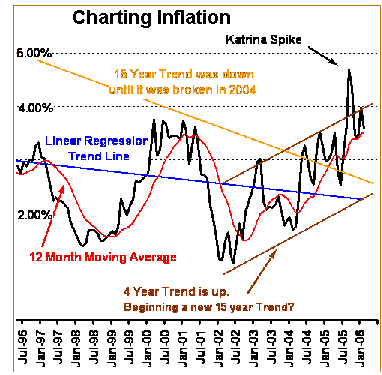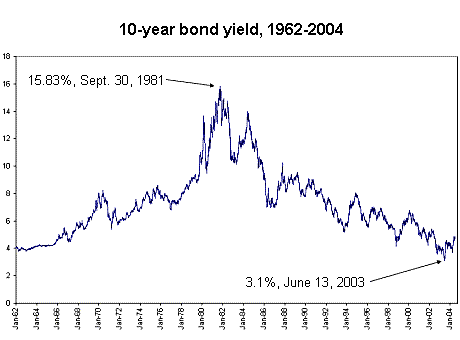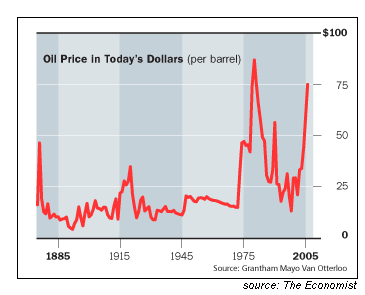| |
Whither the Dollar and Interest Rates?
(July 3, 2006)
Note: I heartily recommend enjoying your morning dose of caffeine before tackling
this entry...
 Astute reader LJR offered this counterpoint to my argument that long-term-rates (and hence
mortgage rates) will rise even if the Fed tried to re-inflate the housing bubble by
dropping short-term rates.
Astute reader LJR offered this counterpoint to my argument that long-term-rates (and hence
mortgage rates) will rise even if the Fed tried to re-inflate the housing bubble by
dropping short-term rates.
My reasoning hinged on the fact that rising inflation will
erode the real (inflation-adjusted) yield of long bonds, forcing foreign buyers (a major source of funds) to demand
higher interest rates, regardless of short-term declines in rates.
LJR provides an explanation
of how long-term rates may well decline in response to a drop in short-term rates (my emphasis added in bold):

"For the sake of argument, when the Fed reduces short term rates the commercial banks borrow
short and lend long using derivatives to contain the risk. By lending long they drive down
long-term rates even if the foreigners don't continue buying.
From a foreigner's point of view, a bond already held will be appreciating in value as long
term rates decline due to the arbitrage behavior of the commercial banks. This means the
foreigners have no incentive to sell since the value of their bond investment is increasing.
Furthermore, new foreign investment may well conclude that the rising value of bonds
overrides the loss of interest income and purchase even more. All these purchases have
the effect of driving up the value of the long bonds even further.
As usual in the world of mathematical finance, nothing is simple. The point is, don't sell
the Fed's main bazooka short. Controlling short term rates is potent weapon. Loaned money
has this two-edged quality of being profitable on the basis of yield when rates rise and on
the basis of equity as rates fall. Took me a long time to get my five neurons wrapped
around that one. Lesson: money-grubbing souls can make a buck whether rates rise or fall.
If the Fed immediately lowered the short term rates to 1% the arbitrage opportunity would
be immense. There would be no amount of short term bond issuance that could soak up demand.
In spite of this counterpoint, I think your main assertion, that the housing bubble can't
be reinflated, is spot on. I think the Fed underestimated the willingness of lendors to
assume risky investments. This led to the creation of new financial funding methods such
as principal only and negative amortization loans. The effect was to drive the house prices
way above what could be financed by a conventional 30 year mortgage at historically normal
rates.
The best the Fed can hope for now is to lower rates as necessary to contain the
damage and let the market sink less rapidly than otherwise. But sink it must since unless
many of us plan to pay 70% of our slave wages to the financial land barons for the rest of
our lives. They'd love that but unfortunately it leaves little left over for GM or Home
Depot.
Controlled deflation of housing values via Fed short term rate setting requires low
inflation. If lowering rates increases economic activity to the point that commodities
are bid up in price then foreign investors are spooked since one of the main reasons they
hold dollars is that it's the settlement currency of account. If the point comes that
the loss of purchasing power due to the dollar's rise vis a vis those commodities exceeds
the gain from rising bond prices they'll be tempted to jump ship, and that's what the Fed
fears most.
 That's why the Fed continues to raise rates. They hope to induce a mild
recession to take some steam out of energy and commodity demand. A fundamental
requirement of being the key currency is that it must not rise rapidly against the
commodities it prices. I happen to believe that the determination of the US to retain
the dollar's role as primary currency of account for energy is central to the Fed's
strategies.
That's why the Fed continues to raise rates. They hope to induce a mild
recession to take some steam out of energy and commodity demand. A fundamental
requirement of being the key currency is that it must not rise rapidly against the
commodities it prices. I happen to believe that the determination of the US to retain
the dollar's role as primary currency of account for energy is central to the Fed's
strategies.
It's a dangerous game but I think the Fed plan is to raise at least another half point
and then wait for the recession to develop. When the market tanks the Fed will lower
rates again once it's convinced the housing bubble is properly pierced. Every new house,
on average, sucks up 400 pounds of copper. Every new house in the exurbs creates at
least one and often two 80 mile daily commutes. Easily 5 gallons of gasoline. Half a
million McMansions in Foggy Bottom can use up 2.5 million gallons of gas a day. Hard to
believe the Fed can't see that this kind of wild development in the hinterlands has to be
curbed. This forced recession is, in essence, a systemic response to higher energy prices.
I think it may be quite healthy. When money talks the system listens.
But as Nick Charles would say, all this thinking is having a serious effect on my drinking." LJR
Well said, LJR--lots of substantive food for thought here, for the dollar and interest rates
are indeed a puzzle worthy of Mr. and Mrs. Charles. (see my review of The Thin Man series under
"Writing/Film" in the left sidebar.) I am still not convinced that inflation won't play into
long-term interest rates in some fashion despite the arbitrage between short and long-term
rates--after all, if inflation has entered a 15-year up-cycle, why wouldn't bonds
follow suit?--but we'll see how that plays out in the months ahead.
Those interested in the thesis that the essential goal of U.S. fiscal and foreign policy
is to maintain the dollar as the primary (global) currency in the oil market, please read
The Real Reasons for the War in Iraq by William Clarke.
(Recommended to me by reader Harun Ibrahim; please see July 1 entry.)
It is a stimulating read. Even if
you absolutely disagree, and find this overwrought or wrongheaded, the consequences of the
dollar being even partially supplanted by a competing currency as the global "coin of the realm"
is worthy of serious consideration.
For more on this subject and a wide array of other topics, please visit
my weblog.
copyright © 2006 Charles Hugh Smith. All rights reserved in all media.
I would be honored if you linked this wEssay to your site, or printed a copy for your own use.
|
|


 Astute reader LJR offered this counterpoint to my argument that long-term-rates (and hence
mortgage rates) will rise even if the Fed tried to re-inflate the housing bubble by
dropping short-term rates.
Astute reader LJR offered this counterpoint to my argument that long-term-rates (and hence
mortgage rates) will rise even if the Fed tried to re-inflate the housing bubble by
dropping short-term rates.
